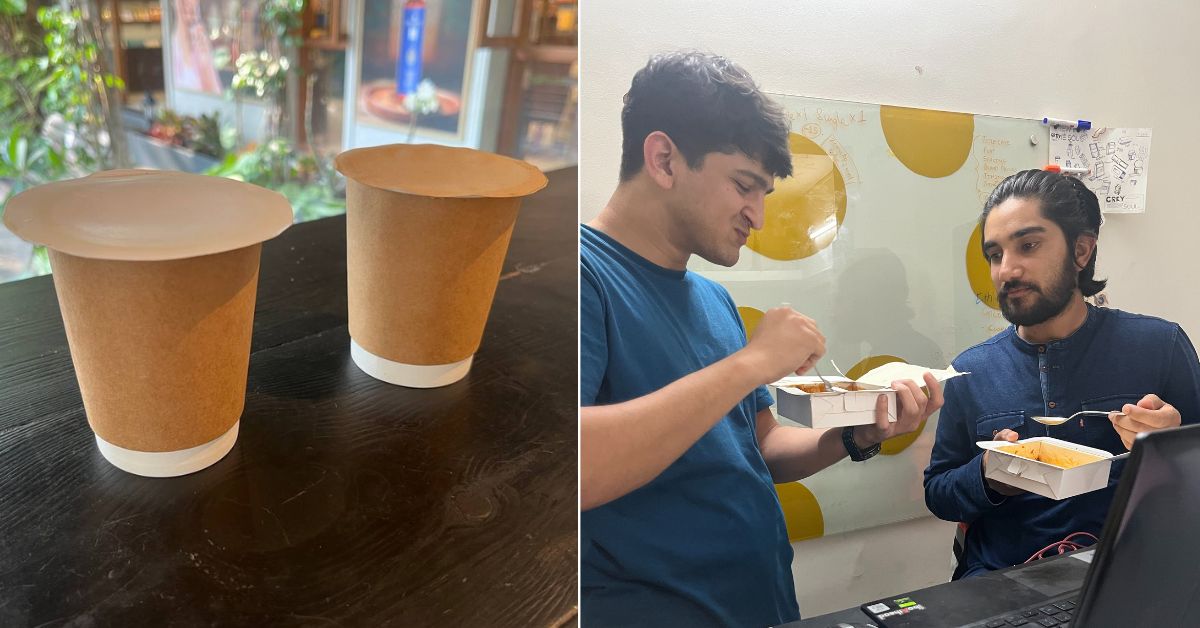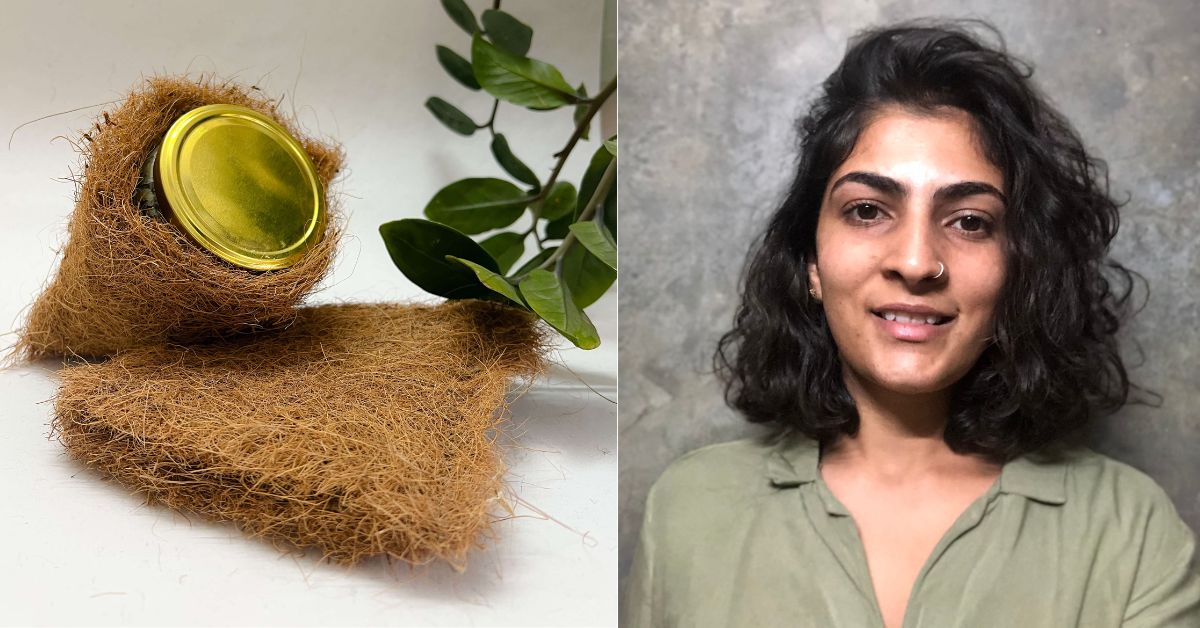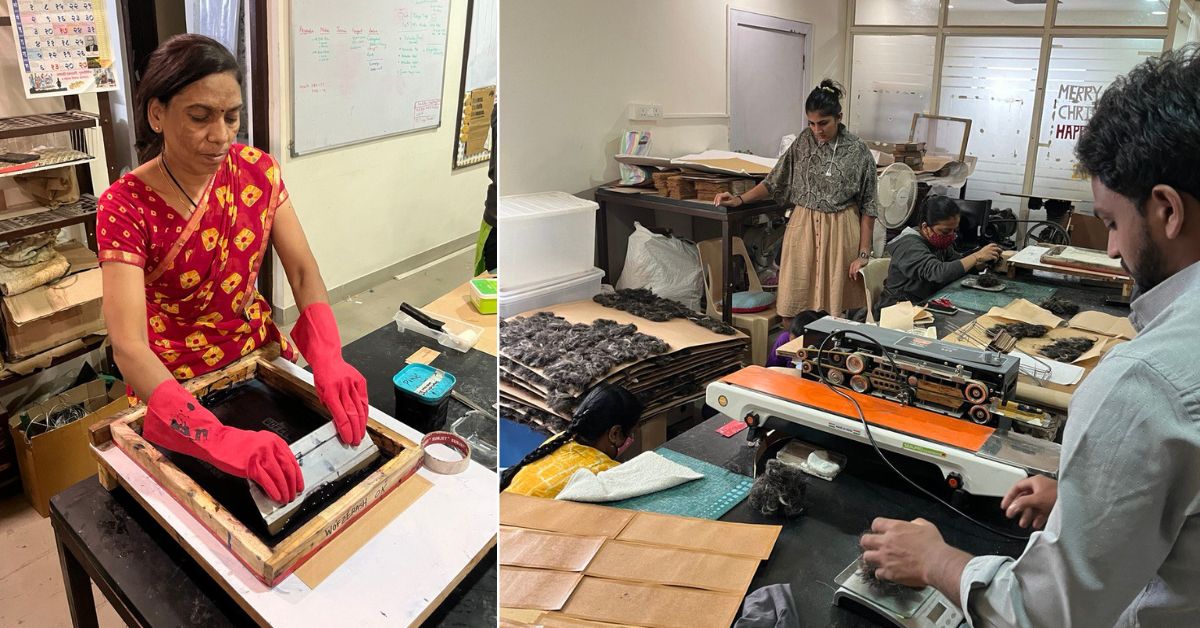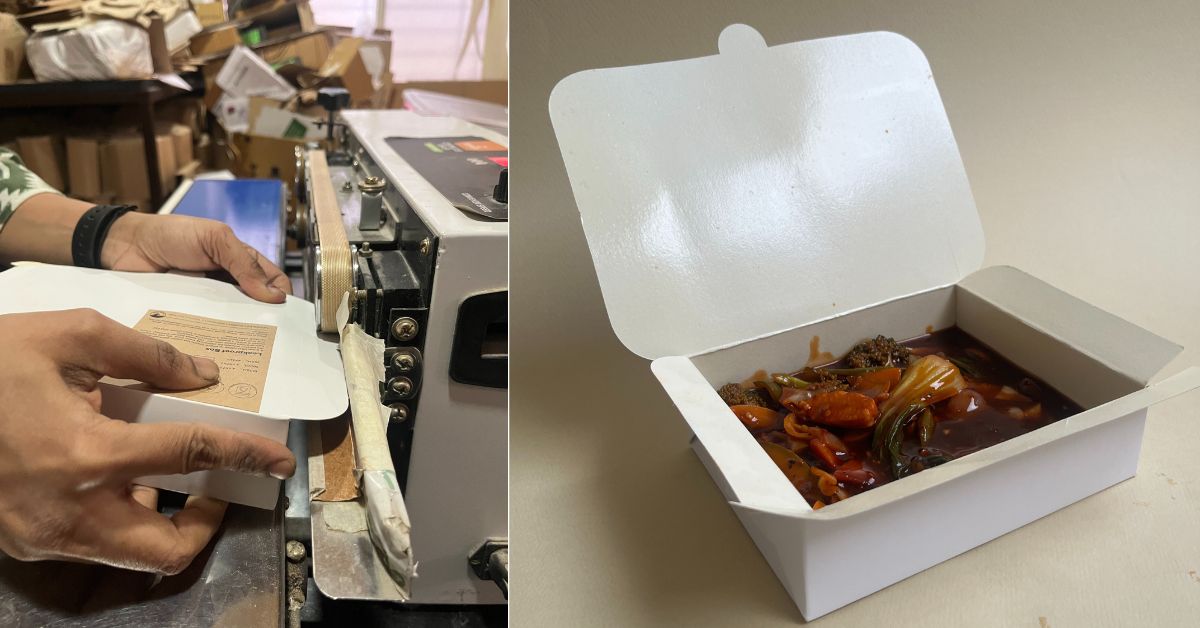Did you know that India alone produces
of plastic waste which ends up in landfills or streams? Despite recycling 60 percent of its waste, plastic waste, including packaging waste, remains littered and unmanaged, impacting terrestrial and aquatic ecosystems.
From packaging films, wrapping materials, shopping and garbage bags to fluid containers, clothing, toys, and building materials, plastic waste has a broad range of applications.
“Even in paper-based packaging for coffee and chai mugs, they are laminated with plastic to make them waterproof. Take, for example, paper-based pouches, boxes, trays, or cups. So, while the majority of the packaging is paper, this lamination makes them unfit to recycle or biodegrade,” says Khushboo Gandhi, founder of Pune-based startup ‘Go Do Good’ that develops .
“Similarly, the black ink, which is commonly used in printing newspapers and magazines, has carbon in it. It cannot go back to the planet without proper processing because it is full of heavy metals and chemicals that will affect the soil,” she adds.

Khushboo says these products are equally durable and keep items like powder, liquid detergent, and food items safe.
In an innovative way, Khushboo has repurposed agro-waste to find alternatives for single-use plastic.
“We work with an array of raw materials like natural pigments, seaweed, and coir to make eco-friendly inks and bubble wraps, along with providing insulation alternatives made from coconut and wool waste. We have also created an eco-friendly coating which replaces the laminated paper,” she says.
With her company ‘Go Do Good’, she has replaced up to 10 tonnes of single-use plastic, printed 1.5 lakh products with eco-friendly inks, replaced 7 tonnes of bubble wrap with , and repurposed 5 tonnes of agro-waste.
Born and raised in Mumbai, Khushboo pursued higher education in design and material development at NIFT. This is where she became interested in packaging design and sustainable practices.
“I’ve also been raised to live in a sustainable manner. I used to save little ribbons from gifts. I was one of those kids who would be fascinated to see the outside of a product more than the product itself,” she laughs.

Khushboo has repurposed agro-waste to find alternatives for single-use plastic.
So, when she started her professional career, she often wondered about various ways to live sustainably and create a larger impact on the planet.
On a trekking tour in Ladakh in 2015, Khushboo shares that she found plastic waste even in the remotest of all places there. “I saw leftover plastic like sachets being burned near a water stream. It really hit me how deep-rooted the problem had become. This needed to be solved,” she says.
Following this, in 2018, she went to pursue her masters in material development in Barcelona, Spain, to formally educate herself in circular economy and design thinking. “This gave me the confidence to actually build materials that can replace plastic,” she adds.
After a year spent in research and development, Khushboo formally launched her company in 2021 along with her brother Ronak Gandhi, and her husband, Chanakya Medh.
Shedding light on the problems in the packaging industry, Khushboo says, “There are multiple types of plastic used for different applications. For example, ink printed on the packaging is toxic as well, and contains heavy metal additives, synthetic chemicals, and paraffin waxes. So even if you have a compostable material, you have to print on it with regular, toxic ink.”
“Similarly, people fail to notice layers of plastic lamination on packaging and the synthetic glue used in the sticker industry. These are the areas we strived to work on,” she adds.
Being a material innovation company, Khushboo’s aim was to solve industrial problems using natural materials which can be composted at home. For instance, the startup has innovated a coating compostable at home which naturally makes paper water-resistant and heat-fillable — two main properties that plastic offers.

The startup uses natural pigments and seaweed to make eco-friendly inks.
“We have also utilised heavy coconut coir that are usually used to make mattresses, rugs, or doormats. This offers excellent cushioning properties for fragile products and acts as a direct replacement for bubble wrap. We also use tamarind seeds to make water-based glue and are replacing the toxic ink with our eco-friendly ink that has been developed from seaweed and natural pigments,” she explains.
Sharing why she zeroed down on using seaweed, Khushboo says, “Seaweed has a polymer structure and behaves very similar to plastic in terms of stretchability, flexibility, and transparency. It can go back to the planet much more easily.”
“These materials allow everything that is on the package and inside the package to be 100 percent biodegradable. and compostable at home. So, tomorrow when you’re done using the product, you can dump it in your backyard and it will compost within 30 to 45 days,” she adds.
Interestingly, Khushoo says, the price difference is also at par with only a 10 percent difference.
“In the market, a 250g paper pillow pouch with a plastic lamination (the pouches in which items like milk, chips, spices are sold in) costs Rs 7 whereas our natural pouch costs between Rs 7.5 to 8. We made our products affordable and compatible so that it would be easier for more and more people to switch to natural materials instead of plastic,” she adds.

Khushboo’s startup has innovated eco-friendly coating which replaces the laminated paper.
Talking about the limitations of the products, she says, “Our products are equally durable. We do not require any tape or synthetic glue and our packaging products keep your flowers, powder, liquid detergent, grains, and takeaway food items safe. The biggest advantage is that you are not compromising on any of the uses while also contributing towards the betterment of our planet.”
As of now, the startup is commercialising its packaging solutions to 50 clients in the B2B sector, including restaurants and cafeterias.
With her work, Khushboo has been able to divert tonnes of waste, but she believes a lot more work needs to be done in replacing multi-layer packaging.
“We are now designing sheets using seaweed that are specifically supposed to replace the transparent plastic sheets directly which are used widely across the country,” she shares.
Looking at the success of her startup, Khushboo says, “For me, it was a meaningful journey. It took time to make way through the packaging industry as it’s a male-dominated industry. As a female founder, you really have to be very headstrong in terms of leading the company.”
“People doubted our capabilities. But we either could have held ourselves back or been enthusiastic about our work. I choose the latter. The impact that we see makes me very positive about the work we do and the amount of change it can bring in the society,” she adds.
Edited by Padmashree Pande. All photos: Khushboo Gandhi.
From packaging films, wrapping materials, shopping and garbage bags to fluid containers, clothing, toys, and building materials, plastic waste has a broad range of applications.
“Even in paper-based packaging for coffee and chai mugs, they are laminated with plastic to make them waterproof. Take, for example, paper-based pouches, boxes, trays, or cups. So, while the majority of the packaging is paper, this lamination makes them unfit to recycle or biodegrade,” says Khushboo Gandhi, founder of Pune-based startup ‘Go Do Good’ that develops .
“Similarly, the black ink, which is commonly used in printing newspapers and magazines, has carbon in it. It cannot go back to the planet without proper processing because it is full of heavy metals and chemicals that will affect the soil,” she adds.

Khushboo says these products are equally durable and keep items like powder, liquid detergent, and food items safe.
In an innovative way, Khushboo has repurposed agro-waste to find alternatives for single-use plastic.
“We work with an array of raw materials like natural pigments, seaweed, and coir to make eco-friendly inks and bubble wraps, along with providing insulation alternatives made from coconut and wool waste. We have also created an eco-friendly coating which replaces the laminated paper,” she says.
With her company ‘Go Do Good’, she has replaced up to 10 tonnes of single-use plastic, printed 1.5 lakh products with eco-friendly inks, replaced 7 tonnes of bubble wrap with , and repurposed 5 tonnes of agro-waste.
From saving ribbons to saving planet
Born and raised in Mumbai, Khushboo pursued higher education in design and material development at NIFT. This is where she became interested in packaging design and sustainable practices.
“I’ve also been raised to live in a sustainable manner. I used to save little ribbons from gifts. I was one of those kids who would be fascinated to see the outside of a product more than the product itself,” she laughs.

Khushboo has repurposed agro-waste to find alternatives for single-use plastic.
So, when she started her professional career, she often wondered about various ways to live sustainably and create a larger impact on the planet.
On a trekking tour in Ladakh in 2015, Khushboo shares that she found plastic waste even in the remotest of all places there. “I saw leftover plastic like sachets being burned near a water stream. It really hit me how deep-rooted the problem had become. This needed to be solved,” she says.
Following this, in 2018, she went to pursue her masters in material development in Barcelona, Spain, to formally educate herself in circular economy and design thinking. “This gave me the confidence to actually build materials that can replace plastic,” she adds.
After a year spent in research and development, Khushboo formally launched her company in 2021 along with her brother Ronak Gandhi, and her husband, Chanakya Medh.
Ink from seaweed, bubble wrap from coir & more
Shedding light on the problems in the packaging industry, Khushboo says, “There are multiple types of plastic used for different applications. For example, ink printed on the packaging is toxic as well, and contains heavy metal additives, synthetic chemicals, and paraffin waxes. So even if you have a compostable material, you have to print on it with regular, toxic ink.”
“Similarly, people fail to notice layers of plastic lamination on packaging and the synthetic glue used in the sticker industry. These are the areas we strived to work on,” she adds.
Being a material innovation company, Khushboo’s aim was to solve industrial problems using natural materials which can be composted at home. For instance, the startup has innovated a coating compostable at home which naturally makes paper water-resistant and heat-fillable — two main properties that plastic offers.

The startup uses natural pigments and seaweed to make eco-friendly inks.
“We have also utilised heavy coconut coir that are usually used to make mattresses, rugs, or doormats. This offers excellent cushioning properties for fragile products and acts as a direct replacement for bubble wrap. We also use tamarind seeds to make water-based glue and are replacing the toxic ink with our eco-friendly ink that has been developed from seaweed and natural pigments,” she explains.
Sharing why she zeroed down on using seaweed, Khushboo says, “Seaweed has a polymer structure and behaves very similar to plastic in terms of stretchability, flexibility, and transparency. It can go back to the planet much more easily.”
“These materials allow everything that is on the package and inside the package to be 100 percent biodegradable. and compostable at home. So, tomorrow when you’re done using the product, you can dump it in your backyard and it will compost within 30 to 45 days,” she adds.
Interestingly, Khushoo says, the price difference is also at par with only a 10 percent difference.
“In the market, a 250g paper pillow pouch with a plastic lamination (the pouches in which items like milk, chips, spices are sold in) costs Rs 7 whereas our natural pouch costs between Rs 7.5 to 8. We made our products affordable and compatible so that it would be easier for more and more people to switch to natural materials instead of plastic,” she adds.

Khushboo’s startup has innovated eco-friendly coating which replaces the laminated paper.
Talking about the limitations of the products, she says, “Our products are equally durable. We do not require any tape or synthetic glue and our packaging products keep your flowers, powder, liquid detergent, grains, and takeaway food items safe. The biggest advantage is that you are not compromising on any of the uses while also contributing towards the betterment of our planet.”
As of now, the startup is commercialising its packaging solutions to 50 clients in the B2B sector, including restaurants and cafeterias.
With her work, Khushboo has been able to divert tonnes of waste, but she believes a lot more work needs to be done in replacing multi-layer packaging.
“We are now designing sheets using seaweed that are specifically supposed to replace the transparent plastic sheets directly which are used widely across the country,” she shares.
Looking at the success of her startup, Khushboo says, “For me, it was a meaningful journey. It took time to make way through the packaging industry as it’s a male-dominated industry. As a female founder, you really have to be very headstrong in terms of leading the company.”
“People doubted our capabilities. But we either could have held ourselves back or been enthusiastic about our work. I choose the latter. The impact that we see makes me very positive about the work we do and the amount of change it can bring in the society,” she adds.
Edited by Padmashree Pande. All photos: Khushboo Gandhi.
